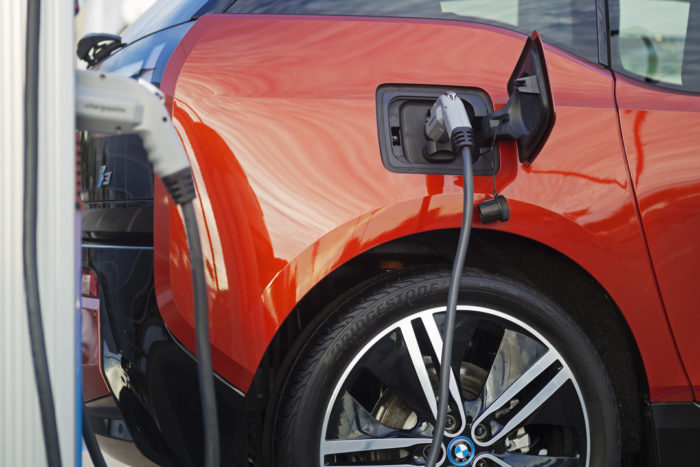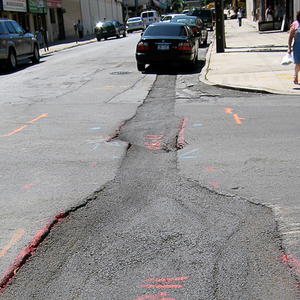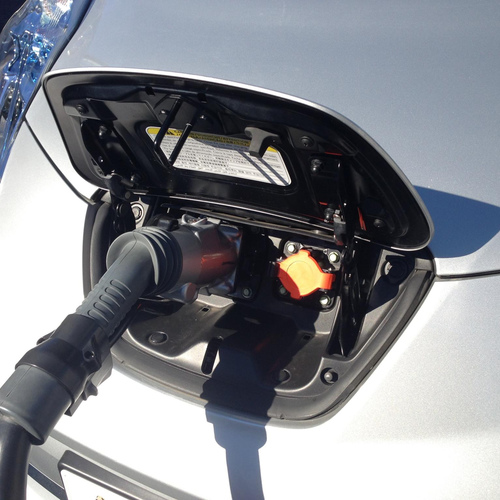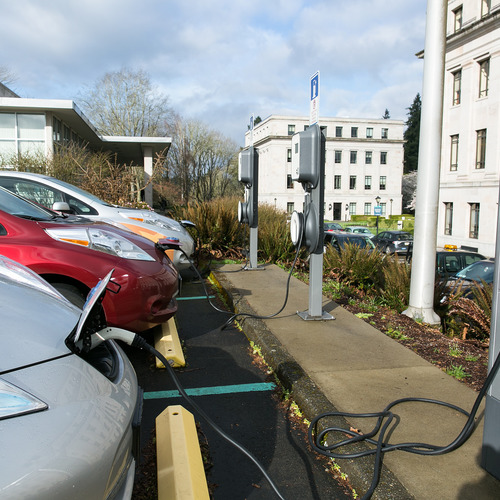
Image Credit: Automotive Rhythms via Flickr
Sales of electric cars were headed for a 30% increase in 2017, but the number of electric and plug-in hybrids sold last year is still a tiny slice of the market and, according to one marketing study, auto dealerships are giving potential customer an inconsistent and sometimes off-putting sales pitch.
The Los Angeles Times reports that the number of all-electric and plug-in hybrids sold in 2017 will be less than 200,000, representing a little more than 1% of the 17 million cars and light trucks that were sold in the U.S.
New and updated models introduced during the year included the Chevy Bolt EV (which advertises a 238-mile range), the Tesla Model 3, and an updated all-electric Leaf from Nissan, which got a mileage boost from 107 to 150 miles per charge, The Times said. But Tesla, with a waiting list of some 400,000 Model 3 customers, delivered just 222 of the cars by the end of the year, according to an article posted at Wired and has pushed back its production target of 5,000 vehicles per week until March.
As notable as sales figures and model upgrades, the newspaper said, was the hype about future products, including promises from a number of big manufacturers to expand their electric vehicle offerings significantly in the years ahead. The list included Volkswagen (50 all-electric models by 2025), Audi, Renault-Nissan, Mercedes Benz, BMW, and Jaguar.
A number of niche manufacturers backed by Chinese investors are readying models for the U.S. And a newly formed company called Future Mobility Corporation introduced the Byton brand, which plans to roll out a mid-sized SUV by the end of 2019.
In other words, there’s plenty on tap but limited excitement among buyers now.
Dealerships need some work
Some potential buyers worry there aren’t enough charging stations and that they’ll become stranded while on trips, a phenomenon called “range anxiety.” But part of the blame can be attributed to auto dealerships, where salespeople are sometimes less than enthusiastic about the electric vehicle future, Greentech Media said in an article.
The website cited a marketing research report by the firm Ipsos RDA, which involved sending secret shoppers to 141 dealerships in the country’s 10 biggest electric vehicle (EV) markets. While Tesla sales people understandably “exude a passion” for plug-in vehicles, the shoppers found that often wasn’t the case at more traditional dealerships.
“The EV sales process, in many instances, has not been differentiated from the traditional and, in effect, is passive,” the report said. “The availability of inventory, as well as critical EV ownership information in-store (from the sales staff or marketing materials) and online, is concerning and leaves shoppers with unanswered questions.
Sometimes electric vehicles weren’t on the lot so potential buyers could neither see nor test drive them. Sometimes the cars were there weren’t charged enough to allow people to drive them. Some sales people knew a lot about electric vehicles while others did not. Marketing material sometimes wasn’t available. When sales people didn’t know how to answer questions they might steer potential EV buyers to conventional gas-powered cares.
“With on-the-lot EV inventory scarce, and salespeople reluctant to search for or order an EV, mystery shoppers were often steered toward a hybrid or a traditional gasoline vehicle,” the GTM report said.
For all of these reasons, customers are less likely to buy an electric vehicle, a conclusion a similar study by the Sierra Club in 2016 also reached.
“Ranging from not carrying electric vehicles on the lot, to insufficiently charging them for test drives, to not featuring them prominently, to not informing customers of charging capabilities or tax incentives, it’s clear auto dealerships and automakers need to be doing much better to promote and sell electric vehicles,” Mary Lunetta, co-author of the report, said at the time.
Weekly Newsletter
Get building science and energy efficiency advice, plus special offers, in your inbox.















2 Comments
Love my plug-in hybrid, but there are issues...
Not long ago I battled a few folks on this website about whether electric cars made any sense.
I am a life long diesel driver. I have had diesel cars, trucks, farm tractors, mowers, and construction machinery. Took my driver's test in an old Mercedes diesel. I went to diesel mechanics night school. I have a clear bias towards Rudolf's invention. I couldn't see the merit in an electric vehicle.
A miracle occurred late last year. I bought a plug-in hybrid, a Ford C-Max Energi. Yep, it has a gasoline engine too.
I love the car and the instrumentation associated with managing the electric and gas drive systems. It's really spectacular. Apparently no one else was similarly enthralled, as Ford announced that they are discontinuing this model.
From what I could tell when plug-in shopping, it is true that dealers aren't excited about selling electric vehicles. In fact in my part of Pennsylvania no Ford dealer is EV certified; I had to drive to Lancaster, PA to buy my car. And when I did get there, the car wasn't charged. Fortunately I had driven the similarly equipped Ford Fusion Energi plug-in hybrid elsewhere, so that wasn't a fatal flaw.
There are also big gaps in charger coverage, unless you are driving a Tesla. (As a farmer it's politically incorrect for me to drive a Tesla.) For instance I really loved the battery only Chevy Bolt, but there is a giant hole in compatible coverage between our farm near State College and NYC where I often trek. Was not clear I could get between the two locations without being stranded, especially if the Bolt's battery capacity was reduced due to cold temperatures, something that I have already experienced with my little red (electric if it wants to be) Ford.
In a few months time I have also arrived at a charging location to find it was busy, or incompatible. Witness the picture of the station near my house that the Sirius Travel Link app on my dash directed me to, but that was of the wrong flavor for my car.
So yes there are problems. However I agree now that it is indeed a technology that has incredible merit.
I look forward to when all the kinks are worked out.
*
PHEVs
People are slow to change and naturally suspicious of the new.
We were early adopters of the Chevy Volt in July 2011. Whilst expensive to buy, it was no more than a small BMW. And frankly. the finish and drive just as good. In 6 1/2 years we have driven 30,000 miles, 97% on EV mode at equivalent to 95 MPG. Hence fuel costs have been about 1/4 the cost of a gas car. We have also spent just $185 on maintenance costs. Yes, that is right $185 in 6 1/2 years. The gas engine is not run-in yet. The drive is also great fun with all that torque. The car still looks brand new, and still has a full 40 mile EV range. Since prices are coming down as volumes are ramping up, there will be a tipping point where people will choose EV/PHEV first. I for one am never going back.
Log in or create an account to post a comment.
Sign up Log in